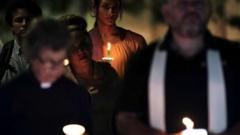Following recent anti-government protests in Kenya that have resulted in at least 31 fatalities and hundreds of injuries, both local and international entities have condemned the government's response. As tensions rise due to unresolved grievances, demands for justice and inquiries into police conduct intensify.
Outrage Surges as Death Toll from Anti-Government Protests in Kenya Climbs to 31

Outrage Surges as Death Toll from Anti-Government Protests in Kenya Climbs to 31
The escalating violence of protests in Kenya has triggered national outrage and calls for accountability as the death toll reaches alarming levels.
The number of people killed in Monday's anti-government protests in Kenya has tragically risen to 31, according to the country's National Human Rights Commission (KHRCR), inciting widespread public outrage and urgent calls for justice. Initially, the state-run organization reported that 11 individuals had lost their lives. The protests have not only led to significant casualties, with over 100 injuries and about 532 arrests, but they also highlight the increasing unrest and dissatisfaction sweeping over the nation.
In response to the rising death toll, the United Nations expressed grave concern over the situation, criticizing Kenyan police for using "lethal ammunition" against demonstrators. Contrarily, police maintain their position, affirming that only 11 fatalities occurred. The unrest in Kenya escalated following the death of blogger Albert Ojwang while in police custody last month, reigniting flames of dissent a year after protests against tax increases swept through the nation.
Originally intended to honor Kenya's long fight for democracy, Monday’s protests spiraled out of control, becoming deadly clashes across 17 counties. Demonstrators voiced their discontent with current leadership, chanting slogans demanding President William Ruto's resignation.
In a statement issued on Tuesday, the KHRCR described the rise in fatalities as "deeply troubling" and condemned human rights violations while urging accountability from all parties involved. The commission reported instances of widespread looting and vandalism of both public and private properties.
Among the deceased was a 12-year-old boy who was reportedly struck by a stray bullet while at home in Kiambu, just outside the capital city. The UN High Commissioner for Human Rights’ spokesperson Ravina Shamdasani stressed the severity of the deadly incidents coming on the heels of last month's protests, which also saw numerous casualties.
The violence has drawn criticism from various civil rights and religious organizations, demanding an immediate and impartial investigation into the violence, property destruction, and indiscriminate arrests. Despite this outcry, Interior Minister Kipchumba Murkomen has lauded police efforts to manage the protests, asserting that law enforcement activities were impeded by criminal elements infiltrating peaceful events.
Opposition leaders have accused the government of utilizing unmarked police vehicles to support armed gangs targeted at dissenting areas during the protests. In a joint statement, they termed the government's actions as state-sponsored violence and called for a nationwide boycott of businesses associated with Ruto’s administration. They declared, “This regime is hostile. It cannot be reasoned with. It must be resisted.”
The Chief Justice of Kenya, Martha Koome, has expressed concern regarding the rising hostility associated with protests, underscoring the potential risk to the democratic integrity of the nation. These protests are primarily driven by the younger generation, referred to as Gen-Z, seeking improved governance and justice for victims of police violence, sustaining a current trend of civil unrest rooted in grievances against governance.
According to a tally conducted by The Star newspaper, over 140 people have lost their lives due to protests within 2023, further highlighting the urgent need for resolution and change in Kenya's socio-political climate.






















